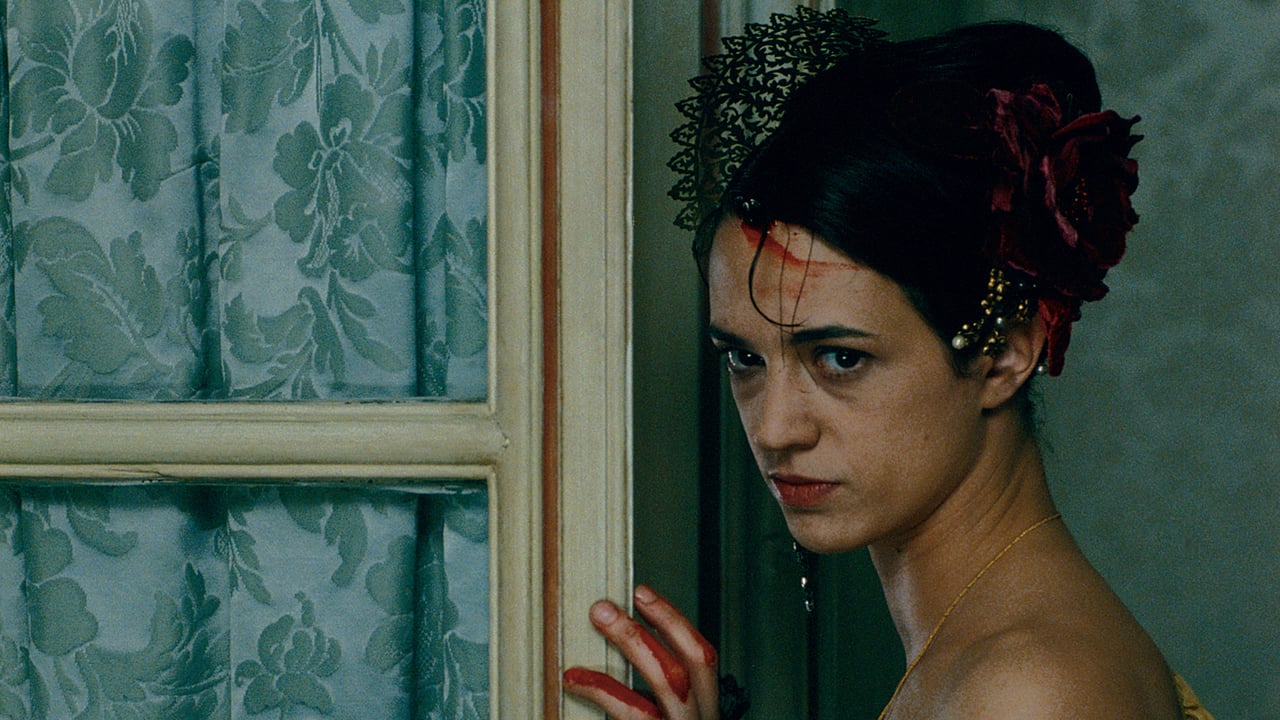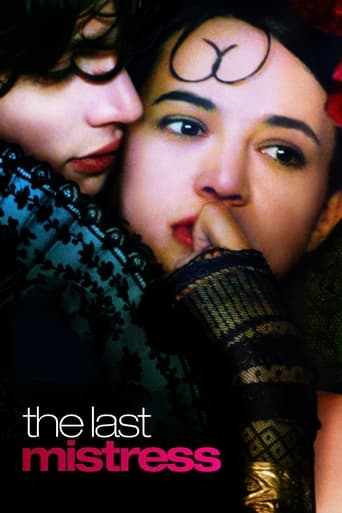Tetrady
not as good as all the hype
Lidia Draper
Great example of an old-fashioned, pure-at-heart escapist event movie that doesn't pretend to be anything that it's not and has boat loads of fun being its own ludicrous self.
Bob
This is one of the best movies I’ve seen in a very long time. You have to go and see this on the big screen.
Isbel
A terrific literary drama and character piece that shows how the process of creating art can be seen differently by those doing it and those looking at it from the outside.
brchthethird
I like costume dramas and period pieces as much as the next person, but this one just didn't sit that well with me at all. Despite the sumptuous detail, exquisite costumes and a great score, it failed to draw me in on an emotional level. For me, none of the characters were in any way likable, and the worst thing was that it felt so stuffy. Besides this, I've only seen one other Catherine Breillat film, ROMANCE which, while having a depressing atmosphere that I often enjoy, was too pretentious for me to really get into. This film, combined with the other, is almost enough for me to swear off Catherine Breillat films from here on out. The basics of the story is that a young nobleman is engaged to be married, but his former mistress of 10 years (Asia Argento) doesn't want to let him go. I've never particularly liked Asia Argento, but she seemed a little more natural in French here then in the few English roles I've seen her in elsewhere. The actor who played Ryno de Marigny, the man to be married, also didn't work for me. He was so uncharismatic and it baffled me how he could have been so entranced by Asia Argento's Vellini. The only two characters that I thought were the least bit interesting were two old ladies, one of whom listens to Ryno's long story about his past with Vellini. At least they seemed like they were having fun with the material. Overall, while it might have a few interesting things to say about fidelity (or the lack thereof) in relationships and excellent production design, to me it was too emotionally vacuous and stodgy to really be effective. Maybe see this if you're a fan of Catherine Breillat, but for everyone else, there are better period pieces worth your time, such as THE INVISIBLE WOMAN.
jaibo
Catherine Breillat's film of d'Aurevilly's 1851 novel may not contain the explicit hardcore elements of her previous films Romance and À ma sœur! but what it lacks in hardcore sexuality it fully makes up for in emotional honesty and explicit anatomising of a love affair.The complicated structure begins with a pair of old gossips, male (the wonderful Michael Lonsdale) and female, taking it upon themselves to prevent the marriage of the beautiful, young and wealthy Hermangarde to the libertine Ryno de Marigny. It is widely known that Ryno has kept a notorious mistress, the Spanish/Italian Vellini, for the past ten years. A few days before his marriage, Ryno pays a call on Vellini and tells her that he will stop coming to see her. She is clearly distressed, and after copulating for one supposedly final time, he leaves her with a bad feeling between them. Ryno must then explain himself to Hermangarde's elderly grandmother the Marquise de Flers, who demands an explanation for the rumours and aspersions that the gossips have been whispering. Ryno swears that he loves Hermangarde, and then tells the Marquise the story of his and Vellini's affair.There follows a long flashback in which the affair is relayed. We see their initial, intense courting - she hates Ryno at first but after he is nearly killed in a duel by her decrepit husband, she gives herself totally to him. They run off to Algeria, have a daughter who tragically dies, spend a lot of time screwing and then decide that they are no longer in love. Despite separating, they can't keep away from each other, and it is only Ryno's current love for Hermangarde which has finally, in his mind, ended the affair. The Marquise is satisfied, with the marriage going ahead in pomp and ceremony, with various misogynist readings from St. Paul peppering the service.But Vellini is not got away from so easy. She stalks her ex-lover and he soon drifts back into her bed. Hermangarde's heart is broken, Ryno feels bad but there's nothing anyone can do. The gossips feel justified in their initial worries but we've seen the situation being far more complicated that they can ever grasp.The brilliance of The Last Mistress is that it fully convinces in it's portrayal of a love affair which operates beyond the socially acceptable structures of sexual relationships. Ryno and Vellini obviously work together, but not all of the time and not fulfilling all of each other's needs. Ryno did genuinely love Hermangarde and wish to settle down with her - whether that was from himself or imposed on him by social convention is an unanswered question - but nevertheless is he drawn inexorably back to the woman with who he shares an intense though imperfect and illegitimate bond. The story is very carefully placed within the social structure and ideological values of its time - which is why the wedding scene with its long misogynist orations is so important. Vellini, and Ryno as well, are not made for these ideological bounds - and the tension between the avenues society gives them and the desires they have within causes them no end of pain.The characters are fully realised sexual beings. Although we don't see the copulating sexual organs as in Romance, we do understand that these are people with sexual organs and that the use they put to those parts of their body is connected to the very core of their being. The actors, especially the stunningly beautiful lead actor Fu'ad Ait Aattou, all do superb jobs of showing the emotional havoc the story wreaks on them. There's a distance to the filming which allows us to see the story without getting too caught up with it, although the costumes, sets and cinematography all have a seductive beauty.There's also a stylisation going on whereby the actors don't age throughout the narrative, as it they are beautiful beings frozen in the roles they are enacting - timeless and eternally suffering. A ravishing and quite wonderful film.
Howard Schumann
Milan Kundera writes: "Human time does not turn in a circle; it runs ahead in a straight line. That is why man cannot be happy: happiness is the longing for repetition." Case in point, Ryno de Marigny (Fu'ad Ait Aattou), an impoverished but elegantly handsome young man who is trapped between the aristocratic world to which he aspires, and an obsessive bond with a defiantly independent mistress, the boldly seductive Vellini (Asia Argento), an older but dazzling Spanish woman said to be born of an Italian noblewoman and a bullfighter. Adapted from a 19th-century novel Une vieille maîtresse by Jules-Amédée Barbey d'Aurevilly, Catherine Breillat's beautiful and elegant The Last Mistress, challenges the patriarchal assumptions of the age by depicting a 36-year old woman's right to fully express her sexual desires even if it is means flaunting society's conventions and Christian misogynist teachings.Set in Paris in 1835, complete with elaborate period costumes and sumptuously decorated drawing rooms, the film opens with the gossip between two aging aristocrats, the Vicomte de Prony (Michael Lonsdale) and his wife, the Countess d'Artelles (Yolande Moreau about the ten-year affair between de Marigny and Vellini and the young man's impending marriage to the wealthy Hermangarde (Roxane Mesquida). Hermangarde's grandmother La marquise de Flers, excellently played by the 80-year-old French writer Claude Sarrate, is an open-minded and rational individual who claims to be a woman of the 18th century. Worried that Ryno will not be able to get over his passion for his fiery Spanish mistress, de Flers listens attentively as Ryno relates to her the details of his long relationship, an affair that he says has now come to an end, telling her that "You don't betray a new love with an old mistress".In flashback, Ryno relates how he was overcome by Vellini's wild beauty after they were introduced at a party ten years before. Vellini, then married to a wealthy but dull Englishman, reacts negatively, however, when she overhears Ryno call her an ugly mutt and the young man is forced to vigorously pursue her despite her strong objections, forcing her to kiss him while the two are out riding. Her horrified husband witnesses the act and challenges Ryno to a duel the next morning. After deliberately missing his first shot, Ryno is shot in the chest, a wound from which he will take months to recover. The incident, however, triggers Vellini's awareness of her love for Ryno, exotically announced by her sucking the blood from the gaping hole in his chest.De Flers presses Ryno for the details of their life together during the past ten years but the dramatic story is better left for the viewer to discover. When the film returns to present time, de Marigny and Hermangarde are married and ostensibly in love, yet he struggles to keep his word to her grandmother by moving away from the temptations of Paris to a remote seacoast. The cigar-smoking temptress, however, also loves the fresh sea air and the stage is set for the film's final act. The Last Mistress is an outstanding work of art that is strengthened immeasurably by striking performances by Asia Argento and first-time actor Fu'ad Ait Aattou. Argento fully captures Vellini's sexual assertiveness but tempers her incendiary disposition with naturalism and a tenderness that makes us care about her fate.Aattou, discovered by Breillat in a crowded café, is almost feminine in appearance with overly thick lips and sensitive eyes, yet he brings a masculine determination to the role that makes him completely convincing. Like the recent film by Jacques Rivette, The Duchess of Langeais, in The Last Mistress love becomes a contest of wills, a power struggle between two people whose relationship consists of a tug of war not only between domination and submission but between 18th and 19th century social codes. That Breillat makes the ride so entrancing is a tribute to her enormous talent.
lustyvita
Its been awhile since I fell in love with a film, THE LAST MISTRESS reignited the flame. It is by far the best film yet of 2008. Few films can really develop the inexplicable magnetism of one person to another, the unbreakable bond that keeps them from drifting afar for too long. Its rare to experience, and difficult to understand. Somehow Breillat has brought to life a rich portrait of the love of a lifetime. Criticisms of pacing are way off, the performers are thinking, soaking in their melancholy and you track that sadness out of the theater in wet footprints. It was hard to leave the room when the credits were over, I wanted more of them, to believe in love no matter how much pain or consequence weathers its journey. Steadfast and true. One of the best female characters to date, and by far a groundbreaking performance from Argento! Rich, passionate, heartbreaking and Breillat's greatest success yet. This is film-making my friends! The younger ones may have trouble understanding or appreciating. For those of us still in love.

